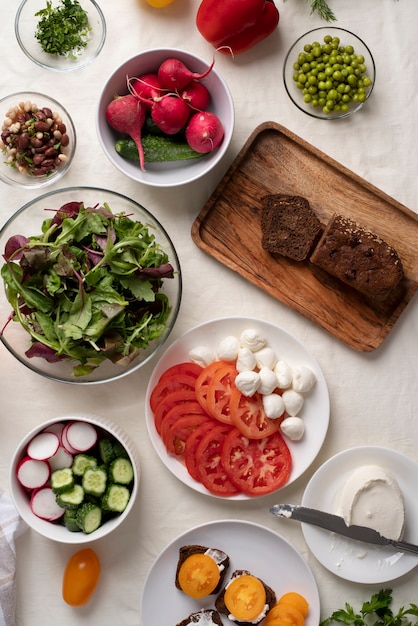What are the top 20 healthiest vegetables?
When it comes to maintaining a healthy diet, incorporating vegetables is crucial. Not only are they packed with essential vitamins, minerals, and antioxidants, but they also offer a myriad of health benefits. Here, we will explore the top 20 healthiest vegetables that you should consider including in your daily meals.
The Benefits of Eating Vegetables
Eating a variety of vegetables provides numerous health advantages. They are generally low in calories and high in fiber, making them ideal for weight management. Additionally, their high water content helps keep you hydrated and can contribute to healthy skin and improved digestion. Studies have also shown that a vegetable-rich diet may reduce the risk of chronic diseases, including heart disease, certain cancers, and diabetes.
1. Kale
Kale, a leafy green vegetable, tops the list of the healthiest vegetables. It is incredibly nutrient-dense, packed with vitamins A, C, and K as well as minerals like calcium and potassium. Kale is also rich in antioxidants and has been associated with reducing the risk of certain cancers.
2. Spinach
Ranked high in nutritional value, spinach is another powerhouse vegetable. It is an excellent source of vitamins A, C, and K, along with iron, folate, and magnesium. Incorporating spinach into your diet may contribute to improved brain function and bone health.
3. Broccoli
Broccoli is renowned for its high antioxidant content and valuable health properties. It is packed with fiber, vitamins C and K, and various minerals. Regular consumption of broccoli has been linked to a reduced risk of heart disease and certain types of cancer.
4. Brussels Sprouts
Brussels sprouts, often overlooked, are loaded with essential nutrients. They are an excellent source of vitamin C, fiber, and folate. These little green wonders also contain compounds that have anti-inflammatory properties, which may contribute to overall well-being.
5. Carrots
Carrots are not only good for your eyesight but also for your overall health. High in beta-carotene, vitamin K, and potassium, these orange delights offer a wealth of benefits. Regular consumption of carrots may help support heart health and enhance immune function.
6. Bell Peppers
Bell peppers come in various vibrant colors, each offering unique nutritional benefits. They are an excellent source of vitamins A and C, as well as fiber. Bell peppers are known for their high antioxidant content, which aids in reducing inflammation and promoting healthy aging.
7. Sweet Potatoes
Sweet potatoes are packed with important vitamins and minerals, making them a nutritious addition to any diet. They are rich in beta-carotene, vitamin C, and manganese. The high fiber content of sweet potatoes contributes to improved gut health and digestion.
8. Tomatoes
Tomatoes are not only versatile but also highly nutritious. Bursting with antioxidants, vitamin C, and potassium, they offer many health benefits. Tomatoes are known to support heart health, improve skin texture, and promote healthy digestion.
9. Cauliflower
Cauliflower is a versatile vegetable that is low in calories but high in nutrients. It is an excellent source of vitamin C, vitamin K, and fiber. Adding cauliflower to your diet may help with detoxification and reduce the risk of chronic diseases.
10. Cabbage
Cabbage is a cruciferous vegetable, meaning it belongs to the same family as broccoli and Brussels sprouts. Its high fiber content promotes healthy digestion, while its vitamins C and K and antioxidant compounds support immune function and reduce inflammation.
Tip: To maximize the nutritional benefits of vegetables, consider incorporating a variety of different colors into your meals. This will ensure you receive a wide range of vitamins, minerals, and antioxidants.
11. Asparagus
Asparagus, a springtime favorite, is not only delicious but also highly nutritious. It is an excellent source of folate, vitamin K, and antioxidants. Asparagus has been associated with various health benefits, including improved digestion and reduced bloating.
12. Green Beans
Green beans are a staple in many diets, and for good reason. They are packed with vitamins A, C, and K, along with fiber and folate. Incorporating green beans into your meals may help strengthen bones and support a healthy pregnancy.
13. Beetroot
Beetroot, with its vibrant color, is a nutritional powerhouse. It contains important nutrients such as vitamin C, potassium, and iron. Studies have shown that beetroot can enhance exercise performance, support liver detoxification, and lower blood pressure.
14. Radishes
Radishes offer a refreshing crunch and numerous health benefits. They are a good source of vitamin C and contain compounds that may have anti-cancer properties. Radishes are also known for their ability to support digestion and promote a healthy complexion.
15. Zucchini
Zucchini is a versatile vegetable that can be enjoyed in various dishes. It is low in calories but rich in nutrients like vitamin C, vitamin A, and potassium. The high water content of zucchini can contribute to hydration and promote healthy digestion.
16. Eggplant
Eggplant, also known as aubergine, is a unique vegetable with a rich, meaty texture. It is a good source of fiber, antioxidants, and vitamins B and K. Incorporating eggplant into your diet may aid in weight management and support cardiovascular health.
17. Avocado
While technically a fruit, avocado is often considered a vegetable due to its culinary usage. Avocados are packed with heart-healthy monounsaturated fats, vitamins K and E, and fiber. They are known for their ability to support brain function and contribute to healthy skin.
18. Cucumber
Cucumbers are not only hydrating but also offer several health benefits. They are low in calories and high in water content, making them an ideal snack for weight management. Cucumbers also contain vitamins K and C, as well as antioxidants that support skin health.
19. Peas
Peas are a nutritious legume that provide a good source of protein and fiber. They are rich in vitamins A, C, and K, as well as minerals such as iron and manganese. Adding peas to your meals can promote healthy digestion and support immune function.
20. Onions
Onions not only add flavor to dishes but also offer various health benefits. They contain antioxidants and compounds that have been linked to reducing the risk of certain cancers. Onions also possess anti-inflammatory properties and promote heart health.
Remember, these are just some of the healthiest vegetables available, and incorporating a variety of them into your diet can offer a wide range of nutritional benefits. Whether you enjoy them raw, cooked, or blended into smoothies, make an effort to include these top 20 vegetables in your meals to support your overall health and well-being.
What are the Healthiest 10 Vegetables for Barbecue?
Barbecues are a popular summer pastime in the UK, but they often revolve around meat-heavy dishes. However, incorporating vegetables into your barbecue can not only add variety to your menu but also boost its nutritional value. Here are the top 10 healthiest vegetables that you can grill for a delicious and nutritious barbecue:
1. Asparagus:
Grilled asparagus is not only tasty but also packed with essential nutrients like vitamins A, C, and K. It is also a good source of fiber and antioxidants.
2. Bell Peppers:
Bell peppers come in various vibrant colors and are excellent for grilling. They contain high levels of vitamin C and other antioxidants that support a healthy immune system.
3. Zucchini:
Grilled zucchini is a great low-calorie addition to your barbecue. It is rich in vitamins A and C, as well as potassium, which supports heart health.
4. Mushrooms:
Mushrooms are a versatile vegetable that can be easily grilled. They are low in calories and fat, while providing a good amount of fiber, vitamins, and minerals.
5. Corn on the Cob:
Corn on the cob is a classic barbecue vegetable loved by many. It contains dietary fiber, vitamins, and antioxidants, making it a healthy choice when grilled.
6. Eggplant:
Eggplants take on a smoky flavor when grilled, making them a delicious addition to your barbecue. They are a good source of fiber, potassium, and antioxidants.
7. Red Onions:
Grilling red onions enhances their natural sweetness and provides a tasty addition to your barbecue. They also contain antioxidants that may help reduce inflammation.
8. Tomatoes:
Tomatoes are high in lycopene, a powerful antioxidant that may have various health benefits. Grilling them intensifies their flavor and boosts their nutritional value.
9. Sweet Potatoes:
Sweet potatoes are a nutritious alternative to regular potatoes. Grilling them brings out their natural sweetness and adds a smoky flavor. They are rich in fiber, vitamins A and C, and minerals.
10. Broccoli:
Grilled broccoli offers a unique taste and texture compared to the traditional steamed version. It is rich in fiber, vitamins, and minerals, including calcium and iron.
Grilling vegetables not only makes them more flavorful but also helps to retain their nutrients. Don’t be afraid to experiment with different seasonings and marinades to enhance the taste of your grilled veggies.
To make your barbecue even healthier, consider using olive oil or a small amount of low-calorie dressing for grilling instead of butter or heavy sauces. This will help keep the calorie content in check while still adding flavor.
So, the next time you fire up the grill, make sure to include some of these healthiest vegetables for a delicious and nutritious barbecue experience!



